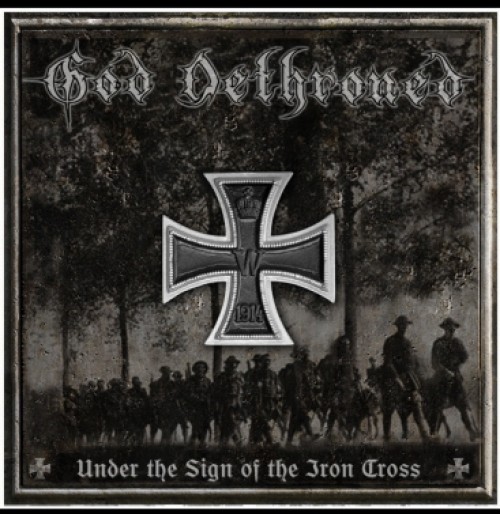
In our oh so humble opinion, God Dethroned‘s Passiondale was one of the best albums of 2009 — even though, in our typically half-assed fashion, we didn’t get around to reviewing it until January 2010, nine months after its release (here). It was unusual in that it was a concept album about one of the most horrific battles of World War I, fought for control of the village of Passchendaele near the town of Ypres in West Flanders, Belgium.
In that battle, the British launched massive attacks, without any decisive success until the Canadian Corps took Passchendaele in November 1917. The result? The Allies had captured a mere 5 miles of new territory at a cost of 140,000 combat deaths — about two inches per dead soldier. And then five months later the Germans recaptured the ground they had lost, without resistance.
Passchendaele became a symbol of “grinding attrition warfare” and the heedless sacrifice of human life by inept military commanders. It would have remained a symbol of senseless sacrifice to this day, except with the passage of time, most people now know nothing about it. But God Dethroned resurrected the memories and constructed a masterful soundtrack to the horrors of that war.
But Passiondale did not exhaust Henri Sattler‘s interest in World War I. He and his bandmates in God Dethroned have now released the second concept album about “The War To End All Wars”. Under the Sign of the Iron Cross (the band’s 9th studio release) is, if anything, even more intense, more emotionally powerful than Passiondale, and it’s simply brilliant — a raw, ravaging assault on the senses that’s also loaded with infectious riffs and dark melodies. If we had the ambition to make our own list of 2010’s best albums, Under the Sign of the Iron Cross would be on it. (more after the jump, including a track for you to hear . . .)
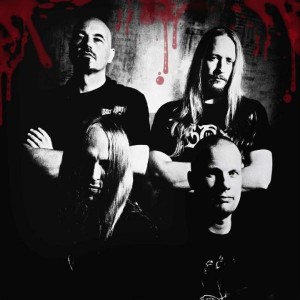 Henri Sattler has explained that he had always wanted God Dethroned to do a concept album, but had never found the right topic. That changed when guitarist Isaac Delahaye joined the band. Delahaye (who has since left the band) lived in Ypres, and on visits to the town, Sattler was drawn to the cemeteries and war memorials. He got interested in the war, visited museums, and started reading. He had found his concept, and that led to Passiondale. Sattler explains that the critical and fan reaction to the album was so positive that he decided to do more with the subject — and there will be yet a third album to complete a World War I trilogy.
Henri Sattler has explained that he had always wanted God Dethroned to do a concept album, but had never found the right topic. That changed when guitarist Isaac Delahaye joined the band. Delahaye (who has since left the band) lived in Ypres, and on visits to the town, Sattler was drawn to the cemeteries and war memorials. He got interested in the war, visited museums, and started reading. He had found his concept, and that led to Passiondale. Sattler explains that the critical and fan reaction to the album was so positive that he decided to do more with the subject — and there will be yet a third album to complete a World War I trilogy.
For Under the Sign of the Iron Cross, Sattler drew particular inspiration from a first-hand account of trench warfare by a German soldier (Ernst Juenger’s In Stahlgewittern (Storm of Steel)), but also constructed songs around the Battle of Verdun (a 10-month conflict that produced a quarter of a million battlefield deaths), the Schlieffen Plan (Germany’s unsuccessful strategy to end the war quickly on the Western Front before Russia could mobilize to the east), and The Red Baron (Germany’s ace in the world’s first war in which combat took to the skies).
For a metal album, these are some unusually serious, bookish subjects, and suitably, the music is some fucking serious metal, too. Given the horrific nature of the subject matter, Sattler wanted the music to be extreme, and indeed it is — perhaps the most intense, most emotionally powerful, most aggressive metal God Dethroned has ever produced.
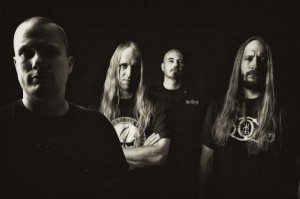 It’s a blackened death-metal soundtrack to a brutal human conflict that decimated an entire generation of men in Europe, and it’s best heard straight through, in a single sitting, because the songs seem organized to produce an effect in combination that’s greater than the sum of the parts. The balanced production on the album (by Joerg Uken and Sattler) also well-suits what Sattler wanted to achieve: The sound is raw and brutally heavy, yet with sufficient clarity that you can hear and admire what’s going on instrumentally.
It’s a blackened death-metal soundtrack to a brutal human conflict that decimated an entire generation of men in Europe, and it’s best heard straight through, in a single sitting, because the songs seem organized to produce an effect in combination that’s greater than the sum of the parts. The balanced production on the album (by Joerg Uken and Sattler) also well-suits what Sattler wanted to achieve: The sound is raw and brutally heavy, yet with sufficient clarity that you can hear and admire what’s going on instrumentally.
The album begins with an instrumental (“The Declaration of War”) — a martial drumbeat and swelling guitar chords that announce the start of the assault to follow, and it’s not long in coming. “Storm of Steel” (the song most directly based on Ernst Juenger’s disturbing diary of daily trench warfare) is a sonic explosion — a fast, ripping attack with raw guitar sound that incorporates tremolo phrasings, a real headbanger of a verse riff, an ominous, ringing melody, and a blazing guitar solo by Danny Tunker. Sattler’s mostly intelligible harsh vocals sing of men “In the grip of rage / On the brink of death”, surrounded by destruction, fighting through a hail of bullets and iron splinters.
With hardly a pause, the band launches into “Fire Storm” (also based on Juenger’s diary), with another sonic assault of distorted tremolo chords that grind and boil. The song includes another furious guitar solo (this time from Sattler), and it conjures images of skies on fire and the air filled with the rushing sound of shells and machine-gun fire.
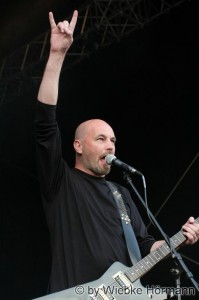 In World War I, far more than in any previous conflict, advances in technology coupled with the settling into trench warfare led to long, brutal artillery battles in which death was inflicted from great distances, as in the battle of Verdun. God Dethroned turns to that aspect of the conflict in “The Killing Is Faceless”. The song begins and ends with a more mid-paced tempo, marked by remorseless guitar grinding. In between those bookends, the blast-beats pummel, the guitars groan and slam with infectious riffage, and Tunker’s guitar leads (or solos) mimic the skin-melting spitfire of flamethrowers washing the trenches in a bath of hellish chaos. Sattler sings about the horrors of “bombardments pulverizing trenches / soldiers ripped to pieces”, and you feel it in the music.
In World War I, far more than in any previous conflict, advances in technology coupled with the settling into trench warfare led to long, brutal artillery battles in which death was inflicted from great distances, as in the battle of Verdun. God Dethroned turns to that aspect of the conflict in “The Killing Is Faceless”. The song begins and ends with a more mid-paced tempo, marked by remorseless guitar grinding. In between those bookends, the blast-beats pummel, the guitars groan and slam with infectious riffage, and Tunker’s guitar leads (or solos) mimic the skin-melting spitfire of flamethrowers washing the trenches in a bath of hellish chaos. Sattler sings about the horrors of “bombardments pulverizing trenches / soldiers ripped to pieces”, and you feel it in the music.
Then comes the title track. It begins with a dual melodic guitar lead, and then Sattler’s growl punches through and the grinding starts. It’s a massively heavy piece of music with yet another infectious verse riff. The melodic introduction is reprised both with a down-tuned tremolo lead and again near the end with a clean guitar lead, and a melancholy keyboard melody. This is the only song on the album to include clean vocals, courtesy of Marco v.d. Velde (The Wounded), and they work well in the context of this song, which expresses both the arrogance behind the Schlieffen Plan and the horrors that would follow its failure.
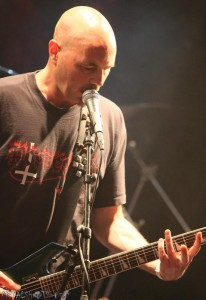 At night along the trenches, relative quiet fell over the war zones, but dawn would bring more artillery, renewed assaults, the explosion of phosphorous shells, the pall of poisonous gas — and that dreaded destruction brought by each new day becomes the focal point of “Chaos Reigns At Dawn”. Musically, this song is more black- than death-metal, a cascade of tremolo-picked fury that’s bleak and dark as indigo. It includes yet another flashy guitar solo, but the dominant image is of unstoppable death rolling mercilessly across a corpse-littered wasteland.
At night along the trenches, relative quiet fell over the war zones, but dawn would bring more artillery, renewed assaults, the explosion of phosphorous shells, the pall of poisonous gas — and that dreaded destruction brought by each new day becomes the focal point of “Chaos Reigns At Dawn”. Musically, this song is more black- than death-metal, a cascade of tremolo-picked fury that’s bleak and dark as indigo. It includes yet another flashy guitar solo, but the dominant image is of unstoppable death rolling mercilessly across a corpse-littered wasteland.
In “Through Byzantine Hemispheres”, the band turns to the conflict on the Eastern Front, where fighting took place in harsh winter conditions and included horrific battles among local militias, episodes of “ethnic cleansing”, and old hatreds unleashed. The music begins with a galloping romp and includes more massive, rhythmic riffing. Consistent with the subject matter, the dark melody has an almost oriental sound.
We’ve referred to guitarist Danny Tunker (Prostitute Disfigurement, Detonation). He replaced Susan Gerl as the band’s permanent lead guitarist before this album was recorded, and he shines on “The Red Baron”. The first segment of the song is fast and furious, bringing to mind images of aerial dogfights, with planes swooping from the clouds spitting bursts of machine-gun fire.
But then the tempo drops and Tunker plays a soulful extended guitar solo, joined at the end in harmony by Sattler. One can imagine a respite in the conflict, the aircraft soaring skyward, the clouds breaking, the sun shining down. But it doesn’t last, and the song’s final segment ramps up again into furious death from above.
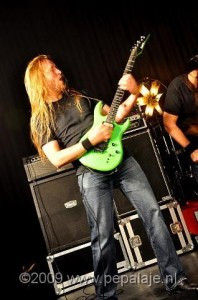 “On Fields of Death and Desolation” closes the album. Thematically, it brings us to the war’s end — with millions dead and vast areas left uninhabitable due to poison gas and four years of shelling and gunfire. The intro to the song is an extended, mid-paced, emotional, guitar-driven instrumental. It gives way to accelerated buzz-saw guitar rhythms and bludgeoning drum fills, and it ends with another extended instrumental melody that mournfully expresses the raping of the earth and the human desolation left in the wake of madness. It’s a fitting close to this powerful album.
“On Fields of Death and Desolation” closes the album. Thematically, it brings us to the war’s end — with millions dead and vast areas left uninhabitable due to poison gas and four years of shelling and gunfire. The intro to the song is an extended, mid-paced, emotional, guitar-driven instrumental. It gives way to accelerated buzz-saw guitar rhythms and bludgeoning drum fills, and it ends with another extended instrumental melody that mournfully expresses the raping of the earth and the human desolation left in the wake of madness. It’s a fitting close to this powerful album.
We’ve taken your time with explanations about the linkages between the music and the historical subject matter because it’s part of why we think the album is so impressive. Even if you couldn’t understand Sattler’s vocals, even if you knew nothing about the concept of this album, the songs would still be a great example of how extreme metal can incorporate not only massive, vicious body-blows of aggression but also dense, dark melodies.
However, knowing what the songs are about gives them another dimension, because you can hear them as effective musical expressions of a real historical experience — a genuine soundtrack to one of the worst episodes in human history of mindless slaughter and cruelty. Few metal bands tackle objectives that are this ambitious. Fewer still have pulled it off this well. Here’s one of the many impressive tracks from Under the Sign of the Iron Cross. We hope it will whet your appetite for more.
For more info, visit God Dethroned’s MySpace page here or the band’s web site here.
P.S. The references in this post to Sattler’s thinking are drawn from a video interview he gave recently to Austria’s Stormbringer magazine, which can be seen here.

Score.
Amazing album.
So good live as well.
They are high on the list of bands I’ve never seen live but badly want to see. I haven’t yet found any information about either European or NorthAm tours in support of the new album, though I assume plans are in the works.
I only caught them as they were main support to The Haunted years ago and were so, so impressive I went out and scoured the earth for their back-catalogue.
Been a dedicated fan ever since.
As a histonerd I have being diggin´ into the war to end all wars. The Passchendale scenario reminded me of the battle of Gallipoli where 500,000 + soldiers died on both sides. The battle of Gallipoli was a result of the pressure on the western front, trying to ease that pressure they decided to try to open up a new front in Turkey who at that time were allied with Germany. As result men no older than me rushed to their deaths into the lead wall of bullets sprouting from machine guns.
It was not a war, it was slaughter. But in the midst of everything evil something good was found http://en.wikipedia.org/wiki/Christmas_truce
Awesome album by the way
Heard about that. Believe they made a movie about it too, right?
The truce or the battle of Gallipoli?
There’s apparently a 2005 French movie about the Truce called “Joyeux Noel”, dramatizing the event through the eyes of French, Scottish, and German soldiers. And by the way, thanks for linking that article about the Truce — what an amazing series of events.
The truce. Although the battle also rings a couple of bells of course.
Yes, and it’s a stunning movie, made by Peter Weir in 1981 and starring a very young Mel Gibson. The battle of Gallipoli was fought on the Western side primarily by Australian and New Zealand troops, and the anniversary of the landing on the Gallipoli Peninsula is a national holiday in both countries (ANZAC Day). In reading the article about the campaign at The Font of all Human Knowledge, I also saw that Sabaton released a song called “Cliffs of Gallipoli” about the battle as part of their Art of War album. Not that I would know, because, well, it’s Sabaton. Here’s the article — an amazing and tragic piece of history:
http://en.wikipedia.org/wiki/Gallipoli_Campaign
Great minds think alike or so they say, I was just reading that article while listening to that song
I haven’t seen the movie in ages, but if there’s a way to track it down, you should if you’re a histonerd (as I am too). It’s powerful stuff.
Great band, amazing album, yadda yadda…
I’m still kicking myself for missing the show when they came through town with Overkill and Vader this past April… hopefully the touring schedule for this album comes near my neck of the woods again!
Only recently got into God Dethroned, absolutely love Passiondale, I am yet to listen to this new beast in full……………that’s my afternoon sorted then.
I predict it will be a memorable afternoon . . .